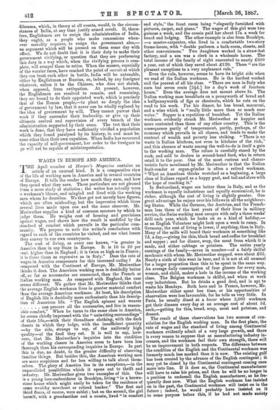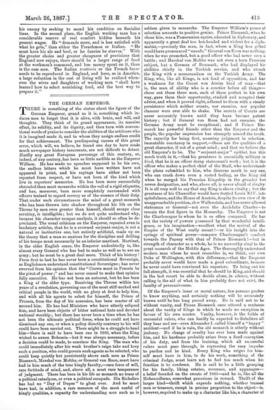WAGES DT EUROPE AND AMERICA.
?THE April number of Harper's Magazine contains an .1 article of an unusual kind. It is a comparative view of the life of working men in America and in several countries of Europe. It tells the reader how much they earn, and how they spend what they earn. These particulars are not gleaned from a mere study of statistics ; the writer has actually worn a workman's blouse, and mingled and lived with the working men whom he describes. We thus get not merely bare figures, which are often misleading, but the impression which these several lives made upon one and the same observer. Mr. Meriwether supplies a kind of common measure by which to judge them. He weighs cost of housing and provisions against wages, and shows how the result is modified by the standard of comfort which prevails in the particular com- munity. We propose to note the writer's conclusions with regard to each of the countries he visited, and see what lesson they convey to our own countrymen.
The coat of living, as every one knows, "is greater in America than in any State in Europe. It is 10 to 20 per cent. higher than in England ; it is twice as high as in France ; it is three times as expensive as in Italy." Does the rate of wages. in America compensate for this increased outlay ? As compared with the Continent of Europe, Mr. Meriwether thinks it does. The American working man is decidedly better off, so far as necessaries are concerned, than the French or Italian working man. As compared with England, the case seems different. We gather that Mr. Meriwether thinks that the average English workman lives in greater material comfort than the average American workman. At least, his description of English life is decidedly more enthusiastic than his descrip- tion of American life. " The English spinner and weaver can procure all the necessaries, and live in reason- able comfort." When he turns to the same class in America, he seems chiefly impressed with the " uninviting surroundings" of their life,—with their threadbare clothing, with the dark closets in which they lodge, with the insufficient quantity —by the side, strange to say, of the uniformly high quality—of the food they eat. It is well to say, how- ever, that Mr. Meriwether's inquiries into the condition of the working classes in America seem to have been less thorough than his corresponding inquiries in Europe. In part this is due, no doubt, to the greater difficulty of observing familiar things. But besides this, the American working men aro more suspicious and far less willing to talk about them- selves. The glory of America lies in its exceptions,—in the unparalleled possibilities which it opens out to thrift and industry. Mr. Meriwether gives two examples of this. One is a young lace-embroiderer in Brooklyn, living "in a brown- stone house which might easily be taken for the residence of come wealthy merchant or retired banker." The first and third floors, of course, were sublet ; but on the second, the girl herself, with a grandmother and a cousin, lived " in comfort
and style," the front room being "elegantly furnished with pictures, carpet, and piano." The wages of this girl were two guineas a week, and the cousin paid her about 17s. a week for board and lodging. The other example is also from Brooklyn, —a master-carpenter, who lived in a comfortable two-story frame-house, with " double parlours, a bath-room, closets, and other conveniences." Two daughters worked in a straw-hat factory, and a son was a clerk in a wholesale house. The total income of the family of eight amounted to nearly £600 a year, out of which they saved about £120. These " are the pleasant exceptions to a very unpleasant rule."
Even the rule, however, seems to have its bright side when we read of the Italian workman. He is the hardest worked and the poorest of all his class. " There are men in Italy who earn but seven cents [3j;d.] for a day's work of fourteen hours." Even the average does not mount above 2s. The Italian working man breakfasts on a pennyworth of bread and a halfpennyworth of figs or chestnuts, which he eats on the road to his work. For his dinner, he has bread, macaroni, and a wine which is "really little more than so much sour water." Supper is a repetition of breakfast. Yet the Italian workmen evidently struck Mr. Meriwether ak happier and more contented than those of any other country. This is the consequence partly of temperament, partly, perhaps, of the economy which prevails in all classes, and tends to make the contrast of wealth and poverty less striking. "There is no waste in Italian kitchens, not even in kitchens of the rich," and this absence of waste among the well-to-do is itself a gain to the working man. The refuse ie carefully stored by the cook, and sold to dealers in second-band food, who in return retail it to the poor. One of the most curious and charac- teristic facts mentioned by Mr. Meriwether is that the Italian fruit-vendor or organ-grinder is often a retired workman. " What an American thinks wretched as a beginning, a large class of Italians regard as a happy goal, and toil and slave with the hope of reaching it."
In Switzerland, wages are better than in Italy, and as the workman is equally industrious and equally economical, he is richer, although the cost of living is slightly greater. One great advantage he enjoys over his fellows in all the neighbour- ing States. While the German, the Austrian, and the French- man lose three of the best years of their lives in military service, the Swiss working man escapes with only a three weeks' drill each year, which he looks on as a kind of holiday,— as an English Volunteer might look upon a week in camp. In Germany, the cost of living is lower, if anything, than in Italy. Many of the mills will board their workmen at something like 7d. a day,—giving for this, black bread and coffee for breakfast and supper ; and for dinner, soup, the meat from which it is made, and either cabbage or potatoes. The entire yearly earnings of the family—seven in number—of a fairly skilful mechanic with whom Mr. Meriwether stopped, were about £65. Nearly a sixth of this went in beer, and it is not at all unusual for a larger proportion than this to be spent in the same way. An average daily consumption of four glasses for every man, woman, and child, makes a hole in the income of the working class. The Belgian workman is skilful, and when at work very industrious. But he drinks a good deal, and is apt to waste his Mondays. Both here and in France, however, Mr. Meriwether either spent less time, or his opportunities of observation were less favourable, for he tells us very little. In Paris, he usually dined at a bazar where 3,000 workmen got their dinners every day at an average cost of about 5d. each,—getting for this, bread, soup, meat and potatoes, and dessert.
The result of these observations has two sources of con- solation for the English working man. In the first place, the rate of wages and the standard of living among Continental workmen evidently admit of a very large growth, and there is every reason to suppose that as manufacturing industry in- creases, and the workmen feel their own strength, there will be an improvement in both respects. The difference between the condition of the English and the Continental workman was formerly much leas marked than it is now. The existing gulf has been created by the advance of the English contingent ; it may yet be closed by the Continental contingent coming once more into line. If it does so, the Continental manufacturer will have to raise his prices, and then he will be no longer in a position to undersell the English manufacturer, as he fre- quently does now. What the English workman has insisted on in the past, the Continental workman will insist on in the future ; indeed, he would probably have insisted on it to some purpose before this, if he had not made society his enemy by seeking to mend his condition on Socialist lines. In the second place, the English working man has a considerable reserve of real comfort hidden beneath his present wages. He "demands more, and is less satisfied with what he gets," than either the Frenchman or Italian. " He must have his ale and beef, or he fancies he starves." With the greater choice and greater cheapness of provisions that England now enjoys, there should be a larger range of food at the workman's command, and less money spent on it, than is the case now. The Italian trattoria or the French bazar needs to be reproduced in England, and here, as in America, a large reduction in the cost of living will be realised when- ever the wives and daughters of working men " shall have learned how to select nourishing food, and the best way to prepare it."















































 Previous page
Previous page